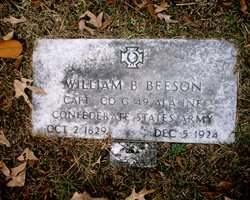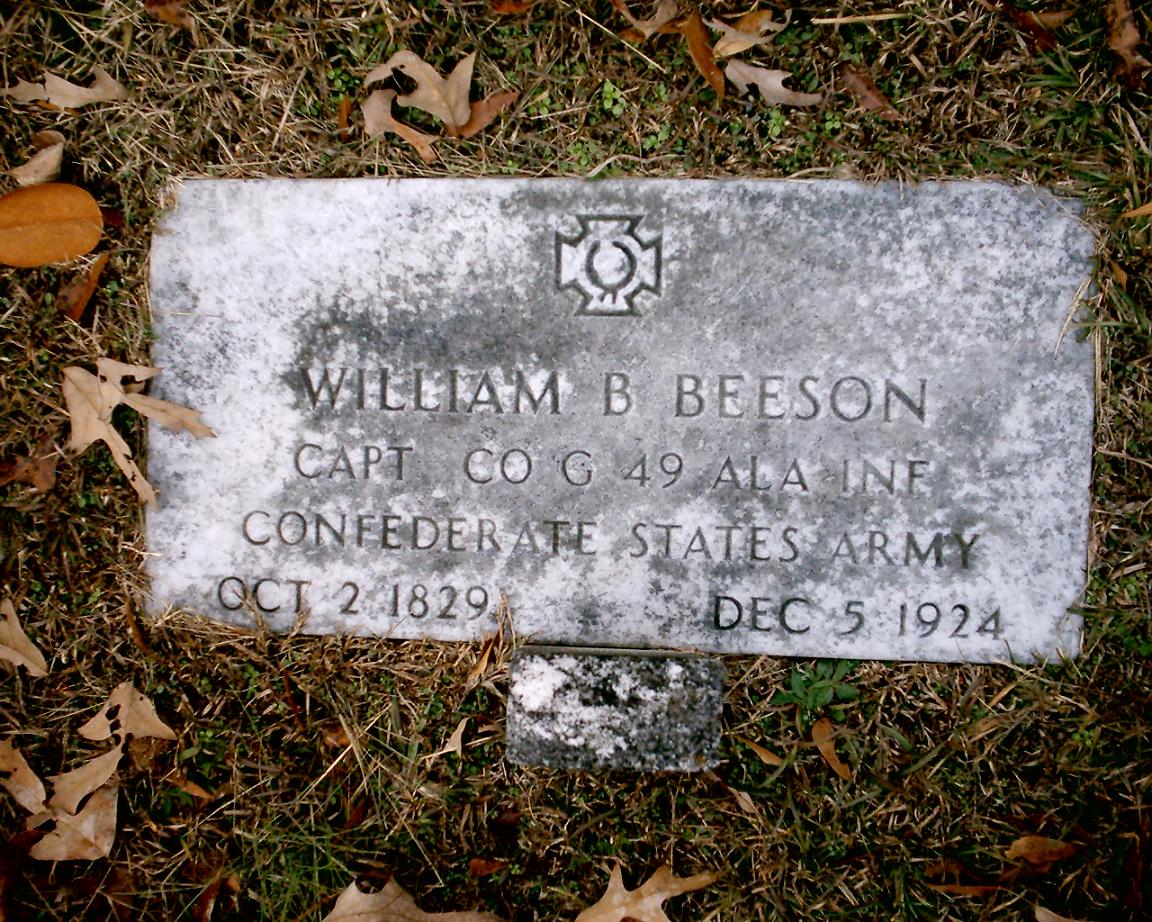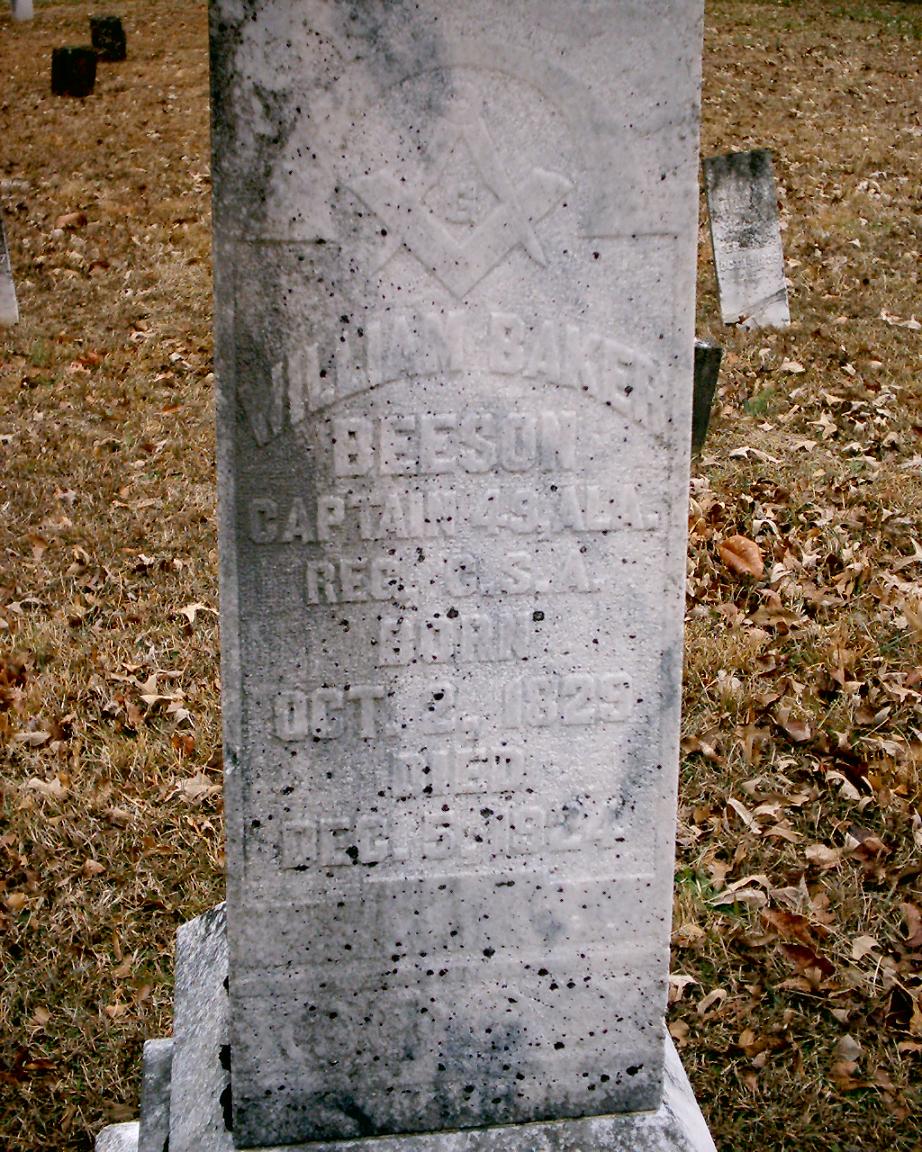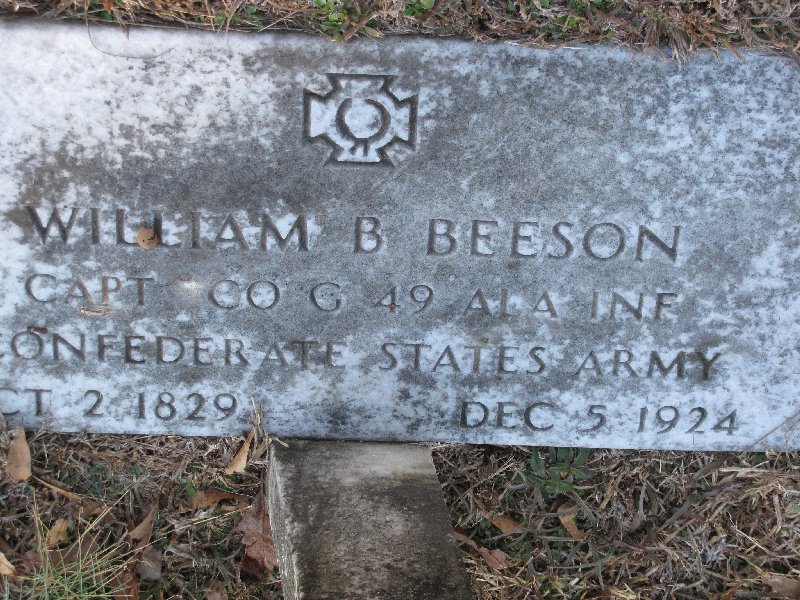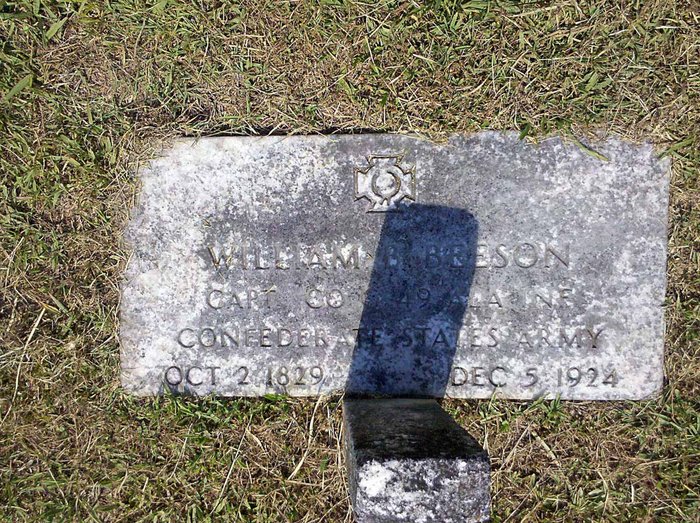Excerpt from BEESON GENEALOGY
by Jasper Luther Beeson, A.B., A.M., PhD.
Civil War Service
Lieutenant William Baker Beeson was commissioned in Hales 31st Alabama Infantry Regiment during December 1861. His regiment was heavily engaged at the Battle of Shiloh in the 1st Brigade of General John C. Breckinridge's Reserve Corps under the command of Colonel Robert T. Trabue and Lt. Colonel Montgomery Gilbreath.
After Shiloh, Hales 31st was administratively renamed the 49th Alabama Infantry Regiment and saw action at Vicksburg, Baton Rouge and Corinth. It spent the winter of 1862-63 near Port Hudson, LA. During this period, William Baker Beeson was promoted to Captain and Company G commander.
From May 21 until July 9, 1863, all members of the 49th Alabama Infantry were killed, wounded, captured or surrendered during the Siege of Port Hudson. Captain Beeson was wounded in the left arm and captured on July 7th and sent to the officer's prison at Johnson Island, Lake Erie, Ohio.
On March 10, 1864, William Baker Beeson was exchanged at City Point Virginia.
In early May 1864, the 49th Alabama was incorporated into Lieutenant General Leonidas Polk's Army of the Mississippi, Major General William W. Loring's Division, Brigadier General Thomas M. Scott's Brigade with the 12th Louisiana Infantry and the 27th, 35th, 55th, and 57th Alabama Infantry Regiments. By May 13th, Scott's Brigade had arrived at Resaca, GA to fight in the epic Atlanta Campaign.
The Organization of Confederate Forces listed in The Official Records of the Union and Confederate Armies, Series 1, Volume 38, Part 3 shows three commanders for the 49th Alabama Infantry Regiment during the 1864 Atlanta Campaign. On June 10th, Lt. Colonel John D. Weeden was the 49th Alabama commander. Orders issued on June 30th, during the reorganization of the Army of Mississippi after General Polk's death, show that Captain William Baker Beeson assumed command and was the last commander of the 49th Alabama Infantry Regiment. Organizational changes on July 10th show the heavily depleted 27th, 35th and 49th Alabama Infantry Regiments combined to form the 27th Consolidated Regiment under the command of Colonel Samuel S. Ives.
Captain William Baker Beeson commanded Company E of the 27th Alabama Consolidated Infantry Regiment during the 1864 battles of Peachtree Creek, the siege of Atlanta, Ezra Church, Franklin and Nashville. Colonel Samuel S. Ives was wounded at the Battle of Franklin on November 30th and Lt. Colonel John D. Weeden assumed command of the 27th. Colonel Weeden was captured at the Battle of Nashville on December 16th and Captain William Baker Beeson again rose to regimental command on the retreat from Nashville and during the January 1865 deployment of the 27th Consolidated to General Joseph E. Johnston's North Carolina Army.
Excerpt from BEESON GENEALOGY
by Jasper Luther Beeson, A.B., A.M., PhD.
Civil War Service
Lieutenant William Baker Beeson was commissioned in Hales 31st Alabama Infantry Regiment during December 1861. His regiment was heavily engaged at the Battle of Shiloh in the 1st Brigade of General John C. Breckinridge's Reserve Corps under the command of Colonel Robert T. Trabue and Lt. Colonel Montgomery Gilbreath.
After Shiloh, Hales 31st was administratively renamed the 49th Alabama Infantry Regiment and saw action at Vicksburg, Baton Rouge and Corinth. It spent the winter of 1862-63 near Port Hudson, LA. During this period, William Baker Beeson was promoted to Captain and Company G commander.
From May 21 until July 9, 1863, all members of the 49th Alabama Infantry were killed, wounded, captured or surrendered during the Siege of Port Hudson. Captain Beeson was wounded in the left arm and captured on July 7th and sent to the officer's prison at Johnson Island, Lake Erie, Ohio.
On March 10, 1864, William Baker Beeson was exchanged at City Point Virginia.
In early May 1864, the 49th Alabama was incorporated into Lieutenant General Leonidas Polk's Army of the Mississippi, Major General William W. Loring's Division, Brigadier General Thomas M. Scott's Brigade with the 12th Louisiana Infantry and the 27th, 35th, 55th, and 57th Alabama Infantry Regiments. By May 13th, Scott's Brigade had arrived at Resaca, GA to fight in the epic Atlanta Campaign.
The Organization of Confederate Forces listed in The Official Records of the Union and Confederate Armies, Series 1, Volume 38, Part 3 shows three commanders for the 49th Alabama Infantry Regiment during the 1864 Atlanta Campaign. On June 10th, Lt. Colonel John D. Weeden was the 49th Alabama commander. Orders issued on June 30th, during the reorganization of the Army of Mississippi after General Polk's death, show that Captain William Baker Beeson assumed command and was the last commander of the 49th Alabama Infantry Regiment. Organizational changes on July 10th show the heavily depleted 27th, 35th and 49th Alabama Infantry Regiments combined to form the 27th Consolidated Regiment under the command of Colonel Samuel S. Ives.
Captain William Baker Beeson commanded Company E of the 27th Alabama Consolidated Infantry Regiment during the 1864 battles of Peachtree Creek, the siege of Atlanta, Ezra Church, Franklin and Nashville. Colonel Samuel S. Ives was wounded at the Battle of Franklin on November 30th and Lt. Colonel John D. Weeden assumed command of the 27th. Colonel Weeden was captured at the Battle of Nashville on December 16th and Captain William Baker Beeson again rose to regimental command on the retreat from Nashville and during the January 1865 deployment of the 27th Consolidated to General Joseph E. Johnston's North Carolina Army.
Inscription
WILLIAM BAKER BEESON
CAPTAIN 49 ALA.
REG. C.S.A.
BORN
OCT. 2, 1829
DIED
DEC. 5, 1924
Family Members
-
![]()
David Marcus Beeson
1858–1882
-
![]()
Julia Elizabeth Beeson Conger
1860–1940
-
![]()
Naomi Jane Beeson McWhorter
1861–1924
-
![]()
John Wesley Beeson Sr
1866–1956
-
![]()
Jasper Luther Beeson
1867–1943
-
![]()
Frances Charlise "Fanny" Beeson Bruce
1869–1957
-
![]()
Martha Ada Beeson Farmer
1871–1911
-
![]()
Eleanor Cornelia Beeson O'Gwynn
1876–1971
-
![]()
Malcolm Alfred Beeson
1879–1971
-
![]()
Mary Summers Beeson
1881–1885
Sponsored by Ancestry
Advertisement
Explore more
Sponsored by Ancestry
Advertisement
